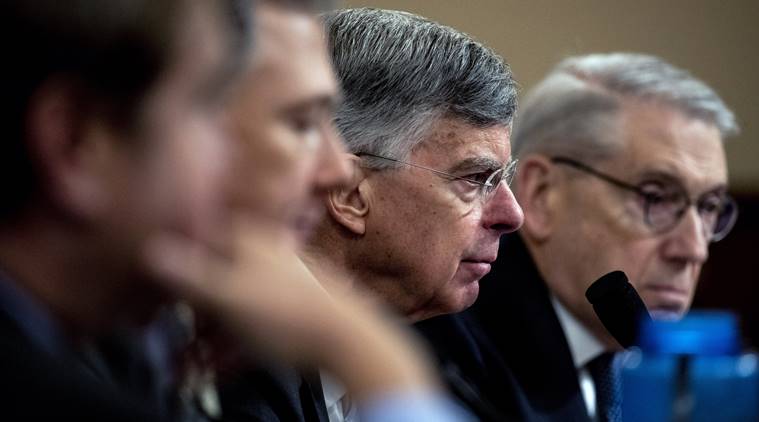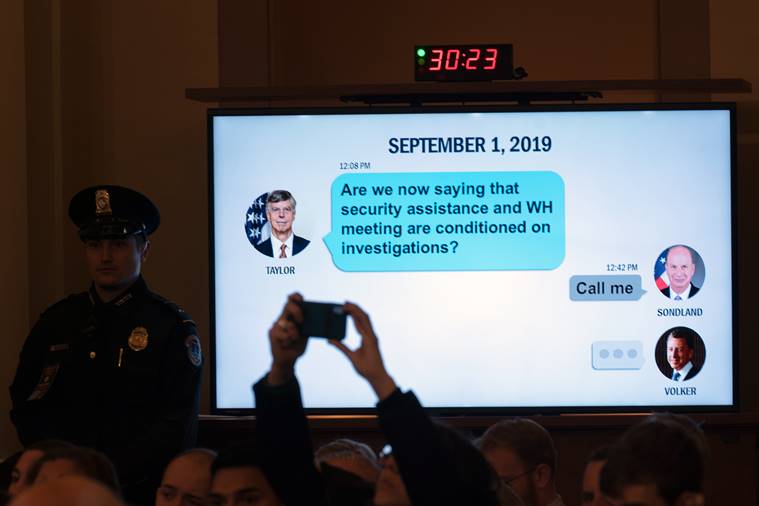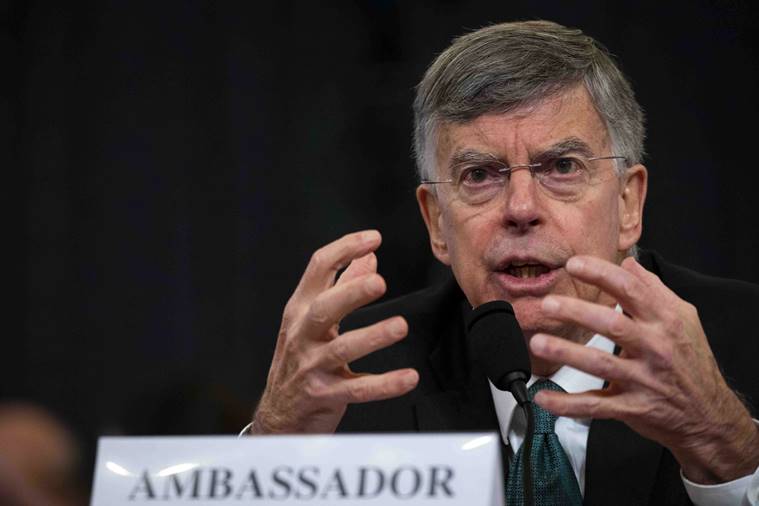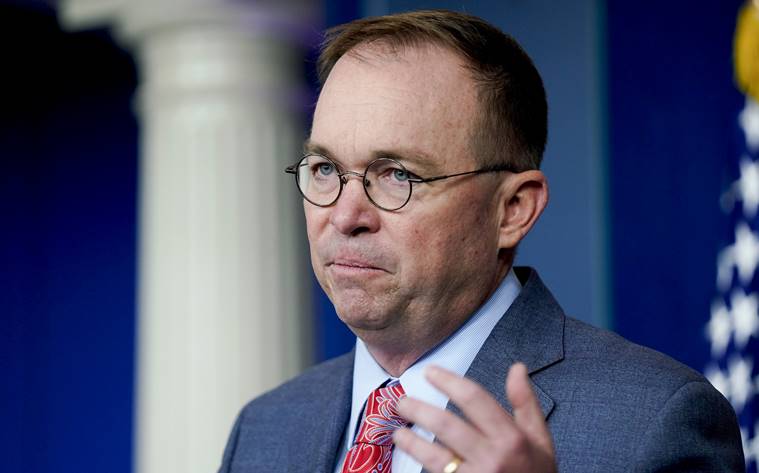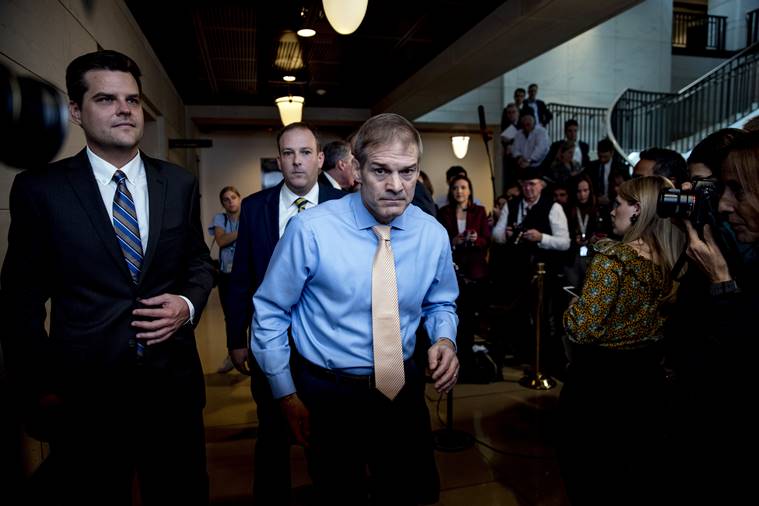In a nationally televised hearing that unfolded in an ornate hearing room near the Capitol, William Taylor, the top U.S. diplomat in Ukraine, testified that he was told that Trump cared more about “investigations of Biden” — former Vice President Joe Biden — than he did about Ukraine.
Written by Michael D. Shear
A crucial witness offered dramatic new testimony Wednesday about President Donald Trump’s preoccupation with having Ukraine investigate his political rivals, as Democrats opened impeachment hearings designed to persuade a bitterly divided nation that the president tried to coerce a foreign power to help him win reelection.
In a nationally televised hearing that unfolded in an ornate hearing room near the Capitol, William Taylor, the top U.S. diplomat in Ukraine, testified that he was told that Trump cared more about “investigations of Biden” — former Vice President Joe Biden — than he did about Ukraine. The revelation, as Congress began the third set of presidential impeachment hearings in modern history, placed Trump at the center of what Taylor described in vivid detail as a “highly irregular” effort to place the president’s political interests at the center of U.S. policy toward Ukraine.
“I don’t think President Trump was trying to end corruption in Ukraine, I think he was trying to aim corruption in Ukraine at Vice President Biden and at the 2020 election,” said Rep. Jim Himes, D-Conn., encapsulating Democrats’ case.
The proceedings, inside the wood-and-plasterwork Ways and Means Committee room adorned with blue and gold, moved into the public’s direct glare an epic clash between Trump and Democrats over impeachment that has so far unfolded in private. And they previewed the intensely partisan battle to come as the president and his Republican defenders raged against an impeachment process they called unfair and illegitimate.
Taylor offered a new detail in his testimony to the House Intelligence Committee about how Trump’s preoccupation with investigating the former vice president and his family had affected his actions toward Ukraine.
Taylor said that a member of his staff overheard a telephone conversation in which the president mentioned “the investigations” to Gordon Sondland, the U.S. ambassador to the European Union, who told him “that the Ukrainians were ready to move forward.” After the call, the aide asked Sondland what the president thought of Ukraine, in Taylor’s telling. The ambassador “responded that President Trump cares more about the investigations of Biden, which Giuliani was pressing for.”
He was referring to Rudy Giuliani, the president’s personal lawyer, whom Taylor described as the leader of an “highly irregular” policymaking channel on Ukraine that ran counter to goals of long-standing U.S. policy. The episode was not included in Taylor’s interview with impeachment investigators last month, because, he said, he was not aware of it at the time.
Rep. Adam Schiff, D-Calif., chairman of the Intelligence Committee, quickly seized on it to try to put the president’s concern with the investigations into context.
“I take it the import of that is he cares more about that than he does about Ukraine?” Schiff asked.
“Yes, sir,” Taylor responded.
Much of the rest of Taylor’s testimony was consistent with what he told the panel previously, an account that included vivid details of how he discovered that Trump was conditioning “everything” about the U.S. relationship with Ukraine — including needed military aid and a White House meeting for Ukraine’s president — on the country’s willingness to commit publicly to investigations of his political rivals. His testimony made it clear that the Ukrainians were well aware of the prerequisites at the time.
The revelation came as Democrats opened the first public impeachment hearing in more than two decades, moving into the public’s direct glare a historic clash between Trump and Democrats that has so far unfolded in private.
Taylor and George Kent, a senior State Department official who is also testifying, were seated next to each other at the witness table. Both men received subpoenas Wednesday morning to appear.
Kent testified that Giuliani conducted a smear campaign against the U.S. ambassador to Ukraine and led an effort to “gin up politically motivated investigations,” according to a copy of his opening statement.
Kent said that he concluded by mid-August that Giuliani’s efforts to pressure President Volodymyr Zelenskiy of Ukraine to open investigations into Trump’s rivals “were now infecting U.S. engagement with Ukraine, leveraging President Zelenskiy’s desire for a White House meeting.”
Kent also assailed what he called a “campaign to smear” U.S. officials serving in Ukraine, which succeeded with the ouster of Marie Yovanovitch, the former U.S. ambassador to Ukraine.
“It was unexpected, and most unfortunate however, to watch some Americans — including those who allied themselves with corrupt Ukrainians in pursuit of private agendas — launch attacks on dedicated public servants advancing U.S. interests in Ukraine,” Kent said in his opening statement. “In my opinion, those attacks undermined U.S. and Ukrainian national interests and damaged our critical bilateral relationship.”
When it was their turn to ask questions, Republicans on the Intelligence panel peppered the witnesses aggressively with rapid-fire questions, working to undercut their accounts as hearsay and supposition, and noting that neither had interacted with Trump.
Rep. Jim Jordan, R-Ohio, a fiery inquisitor who was temporarily moved to the Intelligence Committee to play that role in the impeachment hearings, repeatedly challenged Taylor’s version of events, which he dismissed as secondhand at best.
After Taylor testified that military aid for Ukraine was withheld and conditioned on Ukraine launching the investigations that Trump wanted, Jordan jumped on him, noting that the military aid eventually was delivered.
“What you heard did not happen,” Jordan said. “It’s not just could it have been wrong, it was wrong, because it did not happen.”
The aid was released in September, after the White House had become aware that an intelligence whistleblower had filed a complaint alleging that the money was part of a scheme by Trump to enlist Ukraine to help him in the 2020 election.
Rep. John Ratcliffe, R-Texas, demanded that Taylor and Kent weigh in on whether the president should be impeached for what he said on the July 25 call with Zelenskiy.
“Are either of you here to say there was an impeachable offense in that call?” Ratcliffe demanded. “Shout it out — anyone?”
Taylor reiterated a statement he had made earlier, saying he was not there to take sides, but to share what he knew.
“I’m not here to do anything having to do with deciding about impeachment,” the ambassador said. “That is not what either of us are here for. This is your job.”
Schiff opened the hearing by summarizing the damning facts about Trump’s conduct that have been laid out privately by witnesses thus far, asking, “If this is not impeachable conduct, what is?” He zeroed in on the public admission by Mick Mulvaney, the acting White House chief of staff, that Trump tied aid for the Ukrainians to their willingness to announce investigations into his political rivals.
“I have news for everybody: Get over it,” Mulvaney said during a White House briefing last month, before later recanting. “There’s going to be political influence in foreign policy. That is going to happen.”
Schiff described the statement as breathtaking and cast the hearings now underway as a referendum on Mulvaney’s assertion that Americans should accept Trump’s actions as proper and befitting a president
“If he sought to condition, coerce, extort or bribe an ally into conducting investigations to aid his reelection campaign, and did so by withholding official acts — a White House meeting or hundreds of millions of dollars of needed military aid — must we simply ‘get over it?’ ” Schiff asked. “Is this what Americans should now expect from their president?”
Schiff said the questions at issue in the hearing are about whether Trump’s abuses of power are compatible with the office of the presidency.
“The matter is as simple and as terrible as that,” he said.
The top Republican on the Intelligence panel accused the witnesses of working against Trump, casting previous testimony by diplomats and national security officials about the president’s actions toward Ukraine as nothing more than unfounded, second- or thirdhand allegations from members of a “politicized bureaucracy.”
Rep. Devin Nunes, R-Calif., opened his party’s defense of the president by charging that the allegations were coming from a group of civil servants who “have decided that they, not the president, are really in charge.”
Facing the two veteran diplomats at the witness table, Nunes said they had been convinced, “wittingly or unwittingly,” to be part of a corrupt investigation that he called a “televised theatrical performance, staged by the Democrats.”
“The main performance, the Russia hoax, has ended, and you’ve been cast in the low-rent Ukrainian sequel,” Nunes said. He said diplomats in the State Department had worked to undercut the president and in the process had “lost the confidence of millions of Americans who believe that their vote should count for something.”
Republicans sought to defend Trump at Wednesday’s hearing by repeatedly raising unproven theories about Biden’s son and allegations that Ukraine conspired with Democrats to interfere in the 2016 election on behalf of the president’s rival.
“They accuse President Trump of malfeasance in Ukraine when they, themselves, are culpable,” Nunes said of Democrats in his opening statement. “The Democrats cooperated in Ukrainian election meddling and they defend Hunter Biden’s securing of a lavishly paid position with a corrupt Ukrainian company.”
His allegations were part of the Republican strategy to defend Trump by attempting to shift the conversation away from the mountain of evidence that Democrats have assembled about the president’s conduct, and instead focus on his grudges.
Democrats have so far refused requests for witnesses who Republicans claim would bolster their theories, including Hunter Biden, but Republican lawmakers did not let that stop them from pressing Taylor and Kent to back them up. Both of them largely declined, saying they knew little about any allegation of corruption involving Hunter Biden’s service on the board of Burisma, a Ukrainian energy company.
Asked by a Republican lawyer about Biden’s qualifications to serve on the company’s board, Kent demurred.
“I have no idea what Hunter Biden studied at university or what his CV says,” Kent responded. “I have no awareness or knowledge of what his background was.”
Trump fired off several tweets about the impeachment hearing as it got underway Wednesday even as his press secretary said Trump was not watching the drama play out on Capitol Hill.
“He’s in the Oval in meetings,” Stephanie Grisham, the White House press secretary, told reporters about an hour after the hearing was gaveled open. “Not watching. He’s working.”
Moments after Grisham said that, Trump retweeted several posts from House Republicans attacking the hearings. Earlier, the president tweeted: “New Hoax. Same swamp” shortly before the hearings opened.
As the hearings unfolded, Trump was scheduled to host President Recep Tayyip Erdogan of Turkey at the White House for a daylong visit. Trump is scheduled to hold a joint news conference with Erdogan at about 3 p.m.
Trump has repeatedly shown his willingness to use such appearances with foreign leaders to engage directly with reporters, especially at moments when his administration is engulfed in controversy. The news conference with Erdogan could provide him with an opportunity to rail against the impeachment hearings, setting up the possibility of a compelling split-screen moment from both ends of Pennsylvania Avenue.
Source: Read Full Article
